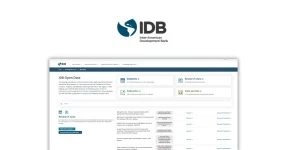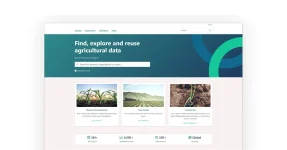At Link Digital, we don’t just derive satisfaction from building open data projects for clients. We enjoy watching the projects that we’ve worked on mature and become active players in their data ecosystems.
One of these projects is the Pacific Data Hub. Built by Link Digital for the Pacific Community (SPC), the principal scientific and technical organisation for the Pacific, the Hub was launched in late 2020 and serves as a gateway to the most comprehensive data collection of relevance to the 22 Pacific Island nations and territories.
The Hub is an excellent example of how a CKAN – Comprehensive Knowledge Archive Network – open data portal can support evidence-based research and informed policy development. But not only does it provide timely, high-quality data to enable the creation of more informed and ‘Pacific-centric’ solutions, it also functions to improve data collection, capacity and literary across the region.
Which is why the Pacific Dataviz Challenge is so exciting to witness. The competition encourages people – regardless of age, location, background and skill level – to experiment with storytelling, design, innovation and technical skill in the visualisation of Pacific related data. And most recent Challenge, the fourth time that it was held, was the most successful yet.
What is a dataviz challenge?
A dataviz encourages participants to use data visualisation to transform raw numbers visually into graphs, maps, charts, or other visual forms, to help tell a story in terms of trends, patters and relationships within the data.
Those taking part in the Pacific Dataviz Challenge are free to use any data visualisation tool, but they must use at least one dataset from the official list of hosted on the Hub. Participants are also free to incorporate other datasets from the Hub, or any other source of open data, i.e., data that are publicly available to anyone for any purpose.
Over time, the Challenge has grown. The 2025 Challenge drew 148 participants, a 50% challenge from last year’s event, with half of them living in the Pacific.
Students, teachers, and professionals from across the Pacific are now using the platform to tell their own data stories. Several schools and universities have even integrated the Challenge into their curriculum.
According to Léo Cann-Polydor, Statistics Analyst at the Pacific Community:
We’ve seen a growing number of young people taking part each year, and more women and girls are participating too. This year, more than half of participants were under 26, reflecting the next generation’s enthusiasm for using data as a tool for change. Sixty per cent of participants were women and girls, notable in a STEM field. This demonstrates that data literacy across the Pacific is improving – more people are learning to understand, analyse, and communicate data effectively.
Telling Pacific stories with data
The Challenge began as an initiative to promote the Hub and encourage the use of data and statistics across the region. The goal was to make data more accessible, engaging, and relevant to everyday life, by inviting participants to use regional open data in transforming complex statistical indicators into visual insights and interactivity, highlighting the region’s potential as well as its pressing challenges.
The theme of the 2025 Challenge was based around the Blue Pacific 2050 Strategy, developed by the Pacific Island’s Forum. This frames a long-term joint regional approach to several key thematic areas, including people centred development, security, resource and economic development, climate change, ocean and Environment and technology.
Storytelling is at the heart of Pacific culture, and with the Blue Pacific 2050 theme, participants were encouraged to raise awareness and inspire reflection on regional challenges. As Manaini Rokovunisei, 2050 Team Leader at the Pacific Islands Forum, put it:
Now more than ever, we must act together guided by science, tradition and solidarity. I’m excited to see data visualisation used through the Pacific Dataviz Challenge to tell stories, raise awareness and inspire change.
The Challenge attracts top talent from across the Pacific and beyond, creating opportunities for young participants to connect with experienced mentors. Many submissions focused on climate change, demonstrating how participants use data to educate, challenge perspectives, and inspire action for a more sustainable Pacific future.
The full list of prize winners and the topics they covered can be seen in the awards ceremony, available to watch in full on the Challenge’s YouTube channel.
Real world impact
Making extensive use of datasets held on the Hub as the basis for the Challenge, is just one of many examples of the real world impact that the site is having. According to Léo Cann-Polydor, Statistics Analyst at the Pacific Community, other examples include:
- The Blue Pacific 2050 Dashboard, which has become a key reference for the region’s strategic framework and was co-developed with the Pacific Islands Forum Secretariat.
- The International Court of Justice case on state responsibility for climate change, led by Vanuatu. Pacific nations sought an advisory opinion on countries’ obligations to protect the environment and the rights of future generations. Some of the data and reports used were drawn directly from the Pacific Data Hub.
Malcolm Fraser, Programme Manager for the Pacific Data Hub, explains:
Good data, well communicated, can inspire change. The Pacific Dataviz Challenge is one way we’re helping to unlock the value of data across the region — supporting informed, evidence-led decisions, innovative thinking and a greater understanding of the Pacific context across a wide range of thematic areas.
The Hub provides access to thousands of datasets across a range of subject areas, including population, trade, climate, education, and health, to support informed, evidence-based decision-making. It is also increasingly used for academic research and classroom learning, helping students connect what they learn to their own countries and realities.
The Challenge is helping to realise the Hub’s vision of ‘Data for the Pacific, by the Pacific, from the Pacific.’
Read more about Link Digital’s work on the Pacific Data Hub here.
Also read: More than just a data hub: an interview with Malcolm Fraser, Programme Manager, Pacific Data Hub



